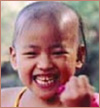Their plights are heartbreaking and, in some cases, desperate. They need bone marrow or blood stem cell transplants, and students at UCSF on Monday, Jan. 31, will aid their search for donors who might save their lives.
 |
| Sara Ruehling |
Sara Ruehling, a six-year-old who loves to color and ride her bicycle, has leukemia. Although siblings or relatives are sometimes ideal marrow donors, Sara has none to be found. She was abandoned at birth at a railroad bridge over the Yangtze River in Nanjing City, China. At nine months old, she was adopted by an American couple and now lives in Three Rivers, CA.
Josiah Zumot, a nine-month-old boy of Japanese-Caucasian descent has a rare genetic disease that affects his immune system and blood clotting He is of Japanese-Caucasian He likes to sleep and normally eats like a horse. He, too, needs a marrow/stem cell transplant.
Minh Tran, a 39-year-old San Jose father of three young children, was diagnosed with myelodysplastic syndrome in July 2003. He has six siblings, but none are a match for the bone marrow he needs.
For decades, the National Marrow Donor Program (NMDP), which now has more than five million volunteer donors, has given patients without a sibling marrow or blood cell match the hope or realization of a healthy life. But only 25 percent of the potential donors in this registry are minorities and only 6.5 percent are of Asian descent.
In 1989, the NMDP had only 123 Asian donors listed, said Joanna Yeh, a first-year medical student and member of the Asian Health Caucus, a UCSF student organization. With so few minority donors, this made finding a match for minority patients almost impossible, she said.
The Asian American Donor Program (AADP) was soon established to give hope to the many Asian children and adults with life-threatening blood diseases including leukemia, severe aplastic anemia, and certain immune deficiency disorders.
This year, as in the past, the Asian Health Caucus will team with the AADP in a drive at UCSF to register potential bone marrow donors.
The drive will be held on Monday, Jan. 31, 11 a.m. to 5 p.m., in the Medical Sciences Building, 513 Parnassus Avenue, near the Nobel Wall and in rooms S 176 and S 178.
Prospective donors should be between the ages of 18 and 60 and in good health. In order for blood to be analyzed and typed, prospective donors will need to supply a small blood sample (about 10 drops) via a fingerstick. Donors will also need to provide contact information (address and phone) of at least two people who do not live with them as well as their driver's license and social security numbers. Once they complete this registration and supply the blood sample, they will be registered with the National Donor Program until they turn 61 years of age.
All ethnic minorities (non-Caucasian) are urged to participate. Due to funding restrictions by the Asian American Donor Program, however, prospective Caucasian donors will have to pay $65 to participate. International students may be donors only if they have permanent residency or a green card and plan to remain in the US.
Currently, marrow donors are first sought among family members only. Seventy percent of patients needing a bone marrow transplant, however, do not have a compatible family member donor. Through HLA (human leukocyte antigens) typing, non-related compatible donors can be successful transplant donors.
Those who have questions may contact the Asian American Donor Program at 1-800-59-DONOR or via
email. More information about the program can be found on the
AADP website.



